TheRoundup is reader supported. We may earn a small commission when you make a purchase via links on this site, at no cost to you.
All products are personally reviewed and tested in accordance with our Review Methodology.

Are you trying to reduce the amount of trash you produce...but still see mountains of it piling up at home every week?
Hate the thought of wrapping your trash in a plastic bag that will add to the global plastic waste problem and take hundreds of years to degrade?
Don't worry - I have the answer!
Degradable, biodegradable, compostable, recycled, reusable, and more...there are an overwhelming amount of sustainable trash bag alternatives on the market.
I’ve carefully picked my way through the best eco-friendly trash bags minefield for you, and can confirm that it IS possible to bag your trash sustainably...but it’s not quite as straightforward as you might think.
Most trash bags are not very eco-friendly. But there are some that are kinder to the planet, without compromising on strength...

✔ Plant-Based Materials
✔ Compostable (BPI and TUV-certified)
✔ Set and Forget Membership
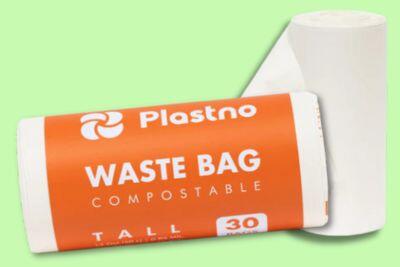
Plastno Compostable Trash Bags are versatile and eco-conscious...perfect for kitchen and household use.
Crafted from renewable, plant-based materials, these bags are non-toxic and fully compostable, promoting sustainability without compromising on quality and durability.
I'm impressed with these bags' strength (even when packed to their 13-gallon capacity). With their multilayer strength, they're capable of handling heavy household waste. The easy-tie closure ensures convenient use and transportation, while the star-sealed bottom prevents leaks, rips, and tears.
These eco-friendly marvels are made from three plant-based materials:
Whether you're using these bags for trash designed for the compost heap in your yard or regular trash heading off to commercial facilities, you can rest assured that the compostability of these bags has been certified by two leading green certifications:
As with all genuinely compostable trash bags, there are a few things you should bear in mind to get the most out of your Plastno Compostable Trash Bags:
Free shipping is available on all US orders over $40, and you can save 15% by using our exclusive code (THEROUNDUPORG).
There's also a neat subscription option (Plastno Membership) if you want to save even more...and never run out of trash bags again.
I don't want to be the guy who gets excited about eco-friendly trash bags...but Plastno has nailed it...and I AM excited!
They're strong, reliable, and certified compostable. Win-Win-Win!
Biodegradable bags work similarly to degradable bags, but with one significant difference.
Natural microorganisms are used to break down the bag rather than relying on chemicals and heavy metals.
Biodegradable bags are a more eco-friendly alternative to degradable trash bags.
However, even the best biodegradable trash bags eventually break down into tiny pieces of polluting plastic, so they’re not an ideal choice for all applications.
To be appropriately certified, both degradable and biodegradable trash bags should be capable of full degradation within one year.
Compostable trash bags are made from natural plant starch. They do not release toxins when breaking down.
An eco-friendly compostable trash bag will decompose fully in the right composting conditions.
Always check the label, though, as some compostable trash bags will decompose in your home compost, whereas others will need to go to commercial composting facilities.
Compostable bags are great for food and garden waste, but cheaper options are not always best for general trash because they can start to break down if left in the trash can for too long.
In addition to the overall winner, I also loved the following during testing.

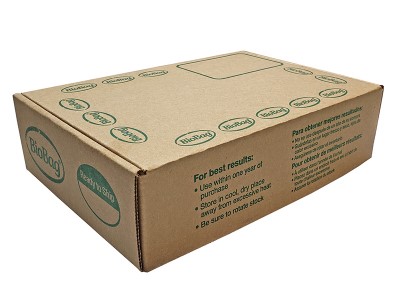
They Say: Ditch the plastic bag! Did you know that normal trash bags take 500 years to break down in landfills? This bulk pack of 13-gallon kitchen bags are compostable and help you reduce your household's dependency on plastic.
We Say: These compostable trash bags are the ideal size for use around the kitchen and really impressed me during testing.
Made from a resin derived from GMO-free crops, these bags will fully compost in a commercial facility.
Looking for a different size? Biobag offers a full range of biodegradable garbage bags. From small pet waste bags to 55-gallon compost bin liners.
The eco-credentials extend to the packaging and shipping too. These bags are packaged in plastic-free and recyclable materials and shipped by EarthHero in recyclable mailers made from recycled content.

✔ Home Compostable
✔ Biodegradable Material
✔ Ideal for Food Scraps
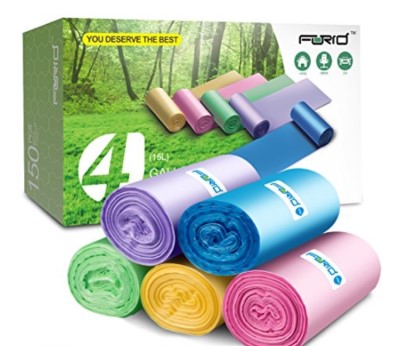
They Say: FORID compostable trash bags are made of 100% plant starch material (PSM),bioplastics based on natural renewable plant starch extracts, and can be composted in backyard or home composting facilities. In the case of composting, it is released as water, humus and CO2 within six months and returned to the ecosystem to complete the organic cycle.
We Say: These 1.2-gallon compostable bags are an excellent option for food scraps and small trash cans around the home and office.
The biodegradable material used complies with the standard ASTM D6400 and the European standard EN 13432.
This means you can compost the bag at home without causing damage to the environment.
If 1.2 gallons is too small for your needs, FORID also offers 2.6-gallon, 4-gallon, 8-gallon, and 13-gallon options.
Some of the more eco-friendly plastic trash bag options on the market use high percentages of post-consumer recycled plastic content.
They're not home compostable or even biodegradable, but they do reuse plastic that would otherwise have ended up in our landfills or waterways.

✔ EPA Compliant
✔ UL ECOLOGO
✔ 1% For The Planet
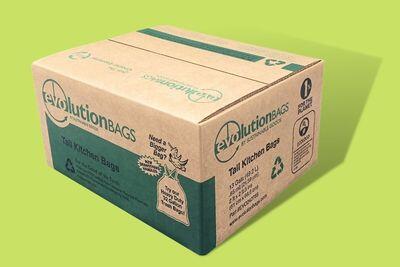
They Say: Sustainable white, super stretch, tall kitchen trash bag with drawstring. 100 bags per box, 2 rolls of 50. One by One dispensing no more perforations to find. Made with 70% (third-party certified) Post-Consumer Recycled (PCR) LLDPE. The exclusive closed-loop recycling process allows our bags to be manufactured at the highest quality.
We Say: These kitchen bin bags are made from 70% certified post-consumer recycled LLDPE plastics and are incredibly tough. I put mine through some seriously rough treatment, and they didn’t even come close to splitting on me.
The drawstring is very convenient and helps secure the bag to stop spills and leaks when moving to the curbside.
Talking of convenience, how each bag is dispensed one at a time is also a nice touch.
Evolution is part of the 1% For The Planet scheme. This is usually a good sign that the company cares about its place in the world and its impact on the planet.
If you’re looking for premium quality tall kitchen trash bags that are hardwearing and eco-friendly, you should consider taking a look at Evolution.

✔ B Corp Certified
✔ Uses Recycled Plastic
✔ Strong
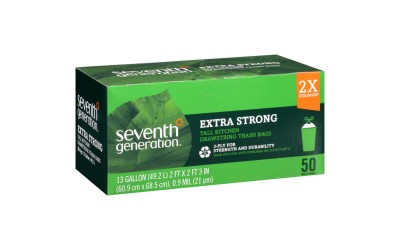
They Say: You need a reliable trash bag in your kitchen; we've all had that experience when it breaks as you take it out. Yuck. Gencore 3-layer technology sandwiches recycled material between two layers of virgin plastic so these bags are tough and resistant to tearing, giving you confidence when you pull your trash bag out of the can.
We Say: Seventh Generation is a B Corp certified company that has been championing eco-friendly products for many years.
So, when I saw they do recycled trash bags, I had to give them a test.
I was not disappointed. These recycled plastic bags are robust. The tie-string design made it easy to close and seal your trash inside the bags.
My one gripe with Seventh Generation trash bags is the level of recycled plastic used. At the current time, it is 65%, which is at the low end of what I would expect from an eco-friendly brand.
Plant-based trash bags provide a great alternative to traditional plastic garbage bags.
They’re made from renewable materials such as cornstarch, sugarcane, and other vegetable starches.
Not only are they better for the environment, but they are also often more durable than conventional plastic garbage bags.

✔ Made from Sugar Cane
✔ USDA Certified Biobased Product
✔ 100% Recyclable

They Say: Plant Based Hippo Sak Tall Kitchen Trash Bags are proudly made from sugar cane instead of fossil fuels, allowing our bags to be renewable, recyclable and reduce your carbon footprint - and are Super Strong as ever! For every 1 kg (2.2 lbs) of plant raw material used to create Hippo Sak Plant-Based Tall Kitchen Bags, they reduce CO2 emissions by 2.15 kg and reduce the consumption of fossil fuel by 2 liters!
We Say: Sooooooooo! I have a feeling this might be a controversial choice.
These bags are not classed as compostable or biodegradable.
My remit for this article was to test and review the best Earth-friendly trash bags of 2025. Any products I recommend need to perform their core function well, at a reasonable price, while also treading as lightly as possible on the planet.
That’s why I’ve chosen Hippo Sak Plant Based Tall Kitchen Bags. They’re an excellent all-rounder.
They’re as heavy-duty as any plastic garbage bag I’ve ever used but contain a minimum of 80% plant-based materials (sugar cane).
This massively reduces the amount of oil needed to make these bags. Which in turn reduces their carbon footprint.
Yes…it’s not ideal that it contains 20% plastic.
Yes...it’s not ideal that these are not biodegradable or compostable trash bags.
However, when you consider the bag dimension (13 gallons) and durability, I believe that they’re a worthy winner.
They’re thick enough to be reused without breaking. Once full, carefully take outside and empty into a large metal trash can ready for collection.
There are more environmentally friendly options, but they’re usually smaller, flimsier, or are for a different purpose (food waste, composting, etc.). I’ll discuss this in more detail later.
Paper trash bags might not sound like a good idea, but they’re a decent eco-friendly alternative to traditional plastic bags.
Paper trash bags are strong (if kept dry), reusable, recyclable, and compostable.
Paper is surprisingly power-hungry when it comes to production, though. A report from the BBC highlighted that it could take four times the amount of energy to produce a paper bag compared to its plastic counterpart.
This is why I like to reuse paper grocery bags as much as possible, especially for trash cans that I know will only receive dry trash (no wet food scraps!).
We have a dog and buy her dry kibble feed in 12kg brown paper bags. These bags are perfect for our medium-sized kitchen trash cans. They can usually be reused five or six times before falling apart. When they get full, I take them outside and empty them into our big metal trash can.

✔ Home Compostable
✔ Heavy Duty
✔ Reusable
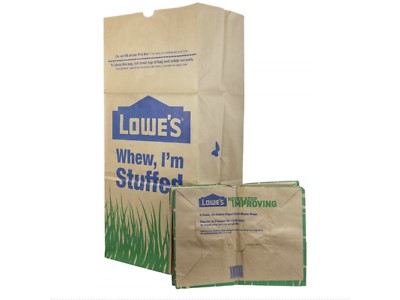
They Say: Maintaining your home is a year-round ordeal. As long as there is waste around your lawn or patio in the summer, fall, winter, or springtime, you’ll need waste bags. These Lowe’s waste bags do the job right. Compact when not in use, just open these two-ply paper bags up all the way and they can stand by themselves for as long as the job goes on.
We Say: These heavy-duty biodegradable paper bags are perfect for yard waste.
The thick, two-ply construction ensures that these bags can handle just about any trash...even Mrs. M’s rose bush cuttings.
Paper trash bags are a higher price option. However, you get what you pay for here.
One bag lasts most people for many days, and it can be reused many times.
Once the eco-friendly bag reaches the end of its life, it goes on the compost pile (usually full of grass cuttings).
Traditional plastic bags that are not recyclable or not made from recycled materials are an environmental disaster. They take hundreds of years to break down and harm human and animal life.
So it's important to scrutinize the product details of any bags you are considering and make sure you do not buy anything containing the following:
It is recommended that you steer clear of any bags made from 100% new plastics. Plastic bags are the worst product for the environment.
Degradable trash bags might sound eco-friendly...but they REALLY aren’t.
Manufacturers use a heady cocktail of toxic chemicals and heavy metals to make degradable trash bags degrade.
These artificial nasties help the trash bag break down when exposed to heat and sunlight.
Unfortunately, this degrading process releases harmful chemicals into landfill, compost pile, waterways, etc., poisoning the land, people, and animals.
If we generated zero waste, then we wouldn’t need trash bags.
In an ideal world, we would all shop at a package-free store, compost our (minimal) food waste, and mend and reuse broken items.
It is actually possible to generate less waste and save money at the same time.
We live in a far from ideal world, however, and the vast majority of us, leading busy lives, will generate at least some waste...no matter how good our zero waste intentions are.
Trash bags are here to stay. But if we reduce waste in our daily lives, we can at least use less of them.
Repurposing materials destined for landfill into reusable green DIY trash bags is a great way to start your journey to a more zero-waste life.
Like the idea of reusable eco-friendly garbage bags, but don’t feel your DIY skills are up to it? This washable option from Planet Wise might be just what you’re looking for.
Either reusable or compostable trash bags are best for the environment.
Compostable bags are designed to disintegrate in a compost pile along with organic waste. These bags are typically made from biodegradable materials like paper, vegetable starches, or bioplastics.
Reusable cloth bags are an excellent choice for reducing waste and minimizing your environmental impact. These planet-friendly trash containers are durable and can be washed and reused many times, eliminating the need for single-use plastic bags altogether.
However, the reality is that most people still do not like the idea of reusable bags and prefer to buy disposable products.
I wouldn’t say it’s bad, but the planet doesn’t really gain anything when you use compostable bags for trash heading to landfill.
According to the Columbia Climate School, “Most landfills don’t get to the temperatures needed for compostable bags to break down, meaning they will essentially mummify along with the other trash in the landfill”.
That's why sending compostable trash to the correct facility is important.
A compostable bag is not the answer to every problem. But you should at least stick to using earth compostable garbage bags for your compostable waste.
10-45 days, according to the Biobag FAQ section.
Using trash bags to pick up dog poop is wasteful as they tend to be oversized for the task at hand. Instead, consider choosing one of the environmentally friendly alternatives mentioned in my article on dog poop bags.
So, there you have it. I hope I’ve helped shed some light on what makes the best green bin bags.
I thought long and hard about whether or not I should be recommending some products containing plastics, and I do feel that compostable trash bags are the best option from an environmental perspective.
However, when these are not available, recycled plastic bags are an option. And while you are unlikely to find 100% recycled trash bags (one day I hope this will be possible), at the moment those with a high percentage are certainly better than those made entirely from virgin plastics.
Garbage bags need to be strong and durable and contain all types of waste, and I feel I’ve covered all bases with my recommendations.
What steps are you currently taking to make your trash bag usage as green as possible? Have I missed your favorite brand/option off the list? Drop me a line and let me know.

Our core values mean we always prioritize sustainability over profit. We carefully evaluate and personally test every product to ensure they meet our high standards. All products recommended in this article were tested in accordance with our Review Methodology.
TheRoundup.org - As Seen On
